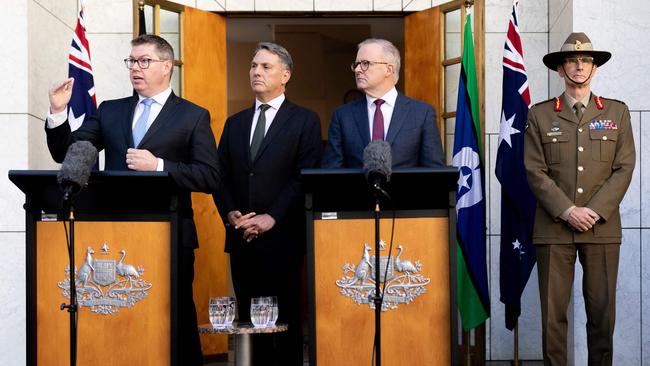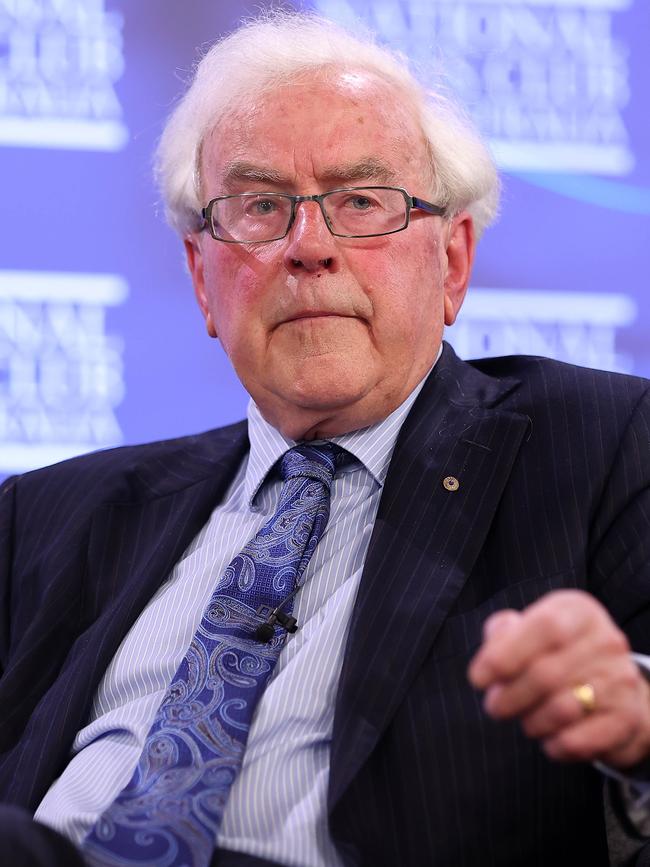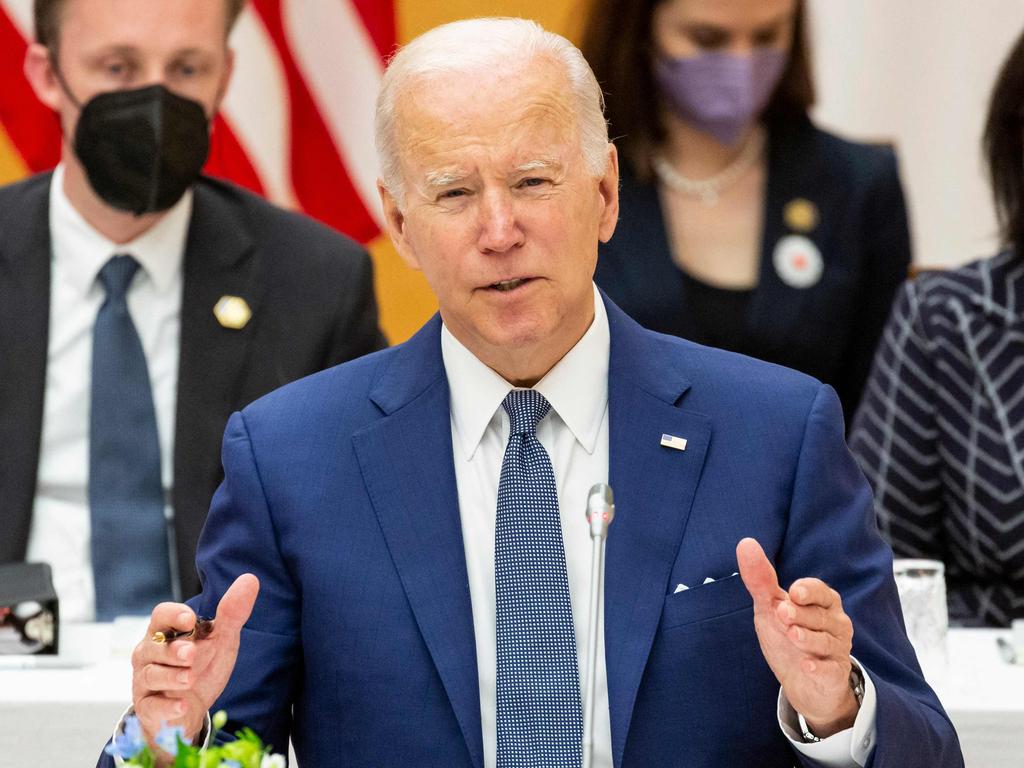
It’s a tragedy for a man guilty of nothing worse than being a brave dissident. It’s also a stark reminder of the nature of the government that is, second only to the United States, the biggest military power on Earth, and that seeks complete dominance of our region.
This underlines the extreme irresponsibility of the Albanese government’s failure to provide for any enhanced Australian defence capability over the next decade. Even our existing capabilities are degrading and disappearing. It’s a secondary scandal that the nation is not more agitated about this. It indicates a bipartisan, cultural collapse in Australia, which no longer seems to take its own defence seriously.
The promise of nuclear-powered submarines under AUKUS slowly becoming available in a decade’s time has become an excuse for both sides of politics to do nothing, commit to nothing, and say nothing of substance on actual defence capabilities.
It’s likely there will be some new money for defence in the May budget. A few specific programs, such as acquiring drones, could be accelerated. But it will be small beer. However, watch out for another version of Canberra’s three-card trick.
The government claims that in 10 years’ time it will increase defence spending from 2 per cent of GDP now to 2.3 per cent. This is meaningless falderal. The government has no power to promise anything in a decade’s time. We routinely now see both sides of politics make big promises for the fictional future, which they will never deliver or be held accountable for, as a way of avoiding doing anything now when they have the power (this was the story with the Coalition’s stage three tax cuts).
There are whispers the government may make a big claim of increasing its defence spending plans a decade out from 2.3 to 2.35 per cent of GDP. This nonsensical claim would be intensely dishonest if it’s not accompanied by a big increase in defence spending now, producing new capabilities in the next few years.

The government may even claim it’s also isolating another 0.15 per cent of GDP for the nuclear subs, but not taking that from the core defence budget. But the only figures that mean anything are those involved in the next 12 months, at most within the budget forward estimates of four years. If we’re not getting new surface ships, missiles, missile defences, drones, counter-drone measures, and quite a bit else, and if big spending on this doesn’t start within the forward estimates, the government is once more just pulling our leg.
If it does make meaningless announcements like these, the government will be hoping for screaming but mistaken headlines about bold new plans for defence. The basic political equation involved in this tomfoolery – meaningless future promises as alibi for inaction today – shouldn’t be tolerated any longer.
In a period of acute strategic vulnerability, with the US more stretched than at any time since World War II, we have decided to do nothing in our own defence interests.
This is an obvious reality. Don’t take my word for it. In a week it will be one year since the Albanese government received the Defence Strategic Review. Nothing has happened since. The government has wasted more than half its term doing nothing. When the government first announced the DSR, it took as the gold standard of such reports the review conducted by Paul Dibb in 1986, under PM Bob Hawke and defence minister Kim Beazley. The government’s ambition was that the DSR would be the most significant defence report since Dibb.
Paul Dibb is in many ways the elder statesman of Australian strategic policy. He has no political axe to grind, just a deep commitment to national security. So what is his assessment of the performance since the DSR was published?

Dibb told me: “It is blatantly obvious nothing much is happening in decision-making in defence, when the world is facing the most dangerous strategic circumstances since World War II. Where is the implementation on anything? We’ve created a bureaucratic monster.”
Dibb referred me to figures that show the mind boggling proliferation of “star-ranked” officers in the Australian Defence Force over the past 20 years. It’s nearly doubled from 120 to 219. That’s one star-ranked officer for every 260 other ranks, whereas in the US it’s one to 1526, and in the UK one to 1522.
“There’s something wrong with the situation those figures reveal,” Dibb says.
Dibb is a thoughtful, considered man. By no stretch of the imagination could he be regarded as a political opponent of the government. Here’s what he says when asked about Australia’s defence preparedness today: “I fear we might get caught short with no notice for some very high-intensity conflict – it could be in the South China Sea, it could be closer to home. If the balloon goes up in Taiwan I don’t believe we can afford not to be there with our US ally.
“We are quintessentially in a maritime threat environment, which means not just ships and submarines but also air power over water. The priority must be maritime strike power, in particular long-range maritime strike. That means missiles with ranges not of hundreds of kilometres but thousands of kilometres. We’re putting in some missile orders, but in very small numbers.
“Drones are clearly a capability we need ourselves. Not only drones but the exquisite intelligence you need to target them accurately. And we need to be able to protect ourselves from drones.”

I pointed out to Dibb the leaked Defence document showing the department was planning to take eight years to evaluate the best type of counter-drone capability to acquire.
He replied: “It takes years to make a decision on anything. It’s worse than crazy, it’s bordering on criminal.”
Defence Minster Richard Marles and Defence Industry Minister Pat Conroy do not effectively run Defence. Defence runs them. This is a personal failure for both men but it’s partly due to the bizarre ministerial structure Labor has put in place.
Defence is the most demanding portfolio in government yet Marles is also Deputy Prime Minister. During Albanese’s frequent absences, he’s Acting PM. Marles is himself an enthusiastic and frequent traveller on defence diplomacy. He’s often not across the detail of defence equipment and is ineffective in leading the department.
The huge portfolio of Defence Industry, responsible for billions upon billions of dollars, is with Conroy. He’s a junior minister, lacking cabinet status, but also lacking a cabinet minister’s staff allocation. Worse, he simultaneously has a second portfolio, so Defence Industry is notionally led by a half-time junior minister with no staff.
In some ways Defence loves this lack of ministerial supervision. But it’s an unmitigated disaster for the nation.








The suspended death sentence, now likely to mean life imprisonment, passed by the Chinese courts, in the service of the Chinese Communist Party, against Australian academic and writer Yang Hengjun is a sign of the utter contempt Beijing has for Australia, for human rights and the rule of law, and for international agreements such as those providing for consular access to our citizens. Foreign Minister Penny Wong is right to protest it vigorously.